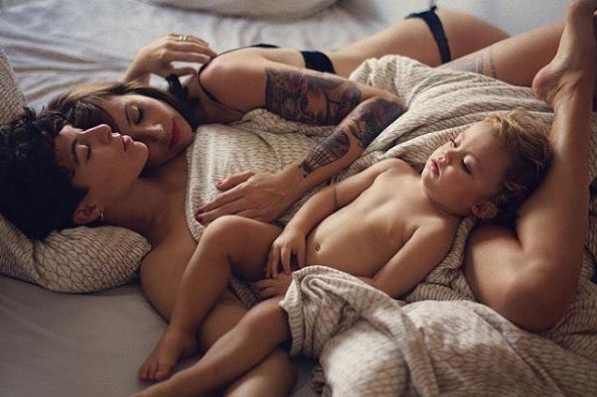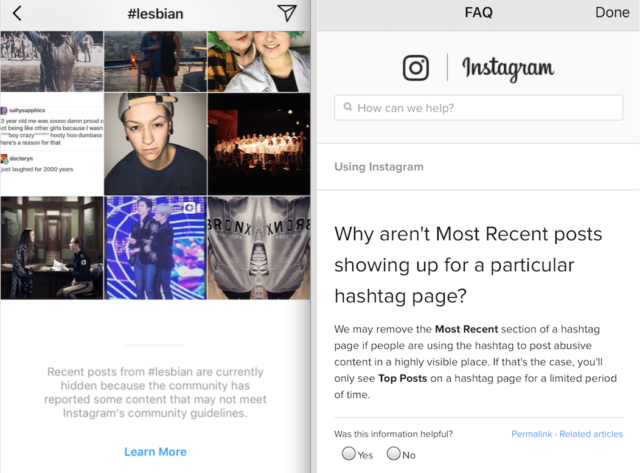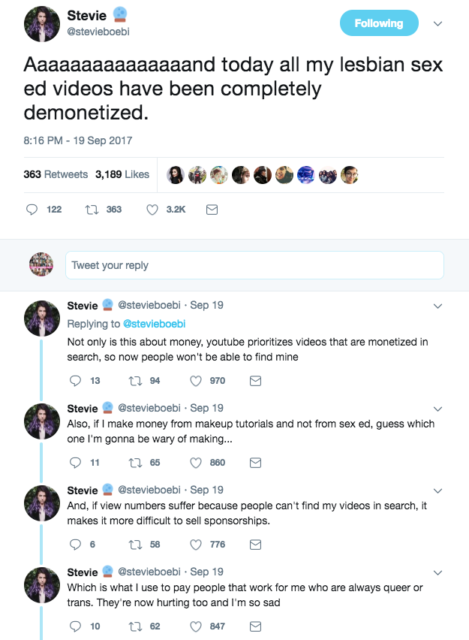
One lesbian couple has been making noise in the media recently after their beautiful Instagram post got flagged and removed. The photo depicts Jana and Veronica, along with their son Alex all snuggling in bed enjoying some quiet family time. Veronica posted it on her lifestyle site Oh! Mami Blue‘s Instagram page. After their photo was shared on several other pages — reaching over 200,000 people — it was reported and taken down by Instagram.
Veronica responded by letting people know what happened on her Instagram stories, asking, “I only see love, what about you?”
“Because that’s what’s shown in the image: A family,” she added.
When I saw this news story circulating the internet, I couldn’t help but wonder: why is everything that queer, lesbian and bisexual women do sexualized? It seems we can’t have a family moment without it being seen as “breaking community standards”, we can’t share a kissing photo without it being deemed “porn” by social media sites, or even walk down the street holding hands as a couple without being ogled by men.
Jana and Veronica seek to show that their family is filled with love. After the photo was reported and taken down, the couple started a hashtag protesting the blatant homophobia. #YoSoloVeoAmor (or I only see love) started to go viral as their followers and other LGBTQ sites used the hashtag to show their own families and partners.
However, people started to report the hashtag, which then also got blocked by Instagram.
“We are a happy family and we are strong, these things no longer hurt us, but there are people right now who take their own lives because of things like these, there are people being bullied, harassed and beaten just for being LGBT,” Veronica told BuzzFeed Spain.
Instagram makes clear that if a photo or hashtag gets reported by enough users, their bots automatically take it down — but it seems that this happens at disproportionately higher rates with LGBTQ pages and content. In response to both their photo and hashtag being taken down, the couple has not given up. They started #BorraIGdehomófobos (or delete homophobes) to get a conversation going on Instagram about how these reports cause serious damage within the LGBTQ community.
Jana and Veronica’s story is not an isolated incident on social media either. The #Lesbian and #Lesbians hashtags on Instagram have turned off the “most recent” viewing in the app because they were being used to post “abusive content in a highly visible place.” If you check out this 2016 list of banned hashtags, you’ll find #womancrushwednesday, #women, #everybodyisbeautiful, #kissing, #lesbiansofinstagram are also hashtags that only allow for the top 30 liked photos in that hashtag to show up. This makes it challenging for LGBTQ people to build a following when their posts won’t be found by the larger community.

This phenomenon of silencing LGBTQ people exists on almost every major social media platform. Queer and trans YouTubers are still speaking out about the fact that many of their videos end up “flagged” or “restricted” by YouTube’s new policies as of May, 2017. While the video platform immediately claimed to have fixed the problem of LGBTQ content being added to the restricted categories — thus making it less visible to many teens and young people who use that content as an access point to information about coming out, sexuality, and gender — this is still an issue more than seven months later.
YouTube is also flagging LGBTQ vlogger’s content as not approved for monetization because their content isn’t “advertiser-friendly.” One of the many reasons YouTubers get to keep on creating all this amazing content is because they work with advertisers and have the opportunity to get paid for their regular videos. But when YouTube flags their content, they can’t monetize their videos anymore. Meaning LGBTQ YouTubers have fewer opportunities to make a living off of their creative work than non-LGBTQ YouTubers — simply because they’re gay. Sound homophobic to you?

Lesbian sex ed YouTuber Stevie Boebi has publicly spoken out about these policies which impact queer, trans, PoC, and disabled vloggers at much higher rates. When one user responded to her Twitter thread saying she should just “remove the keyword lesbian from title and tags,” Boebi responded that she’d rather die. Stating: “I refuse to be forced to f*cking silence my identity just because others have sexualized it. Lesbian is not a dirty word.” That’s why she and many other content creators have taken to crowdfunding on sites like Patreon to ensure they can still make a living while doing what they love.
As a publication, we at GO Magazine are constantly pushing back against Facebook’s advertising policies which deny our article promotions. The thing is, when articles don’t get promoted on Facebook — the social media platform buries them and an average 400 out of 25,000 followers will end up seeing the piece in their newsfeed. So when our articles get denied promotions because of “obscene nudity” or “promoting sex toys” — we are losing visibility to the people who want to read our content. And trust me, a photo of two women holding hands (fully clothed) is not obscene nudity nor is it promoting sex toys of any kind.
It’s important to note here that LGBTQ people aren’t fighting so hard to keep our content visible just so we can make a profit (while that is important to be able to survive). A lot of the content we’re fighting for has the ability to save lives but now is not visible to those who need it most. Many queer and trans youth find life-saving resources through digital media platforms like Instagram and YouTube. Homophobia and transphobia still exist and young people are kicked out of their homes — or worse — especially in rural America where there is less access to information and LGBTQ community centers. Online communities become a safe haven for many of these young queer and trans kids who have no one else to turn to.
The question that I keep coming back to is, why are LGBTQ daily lives seen as overtly sexual? Our conversations about safer sex. Our cute proposal videos. Our family portraits. Our conversations about homophobic policies. Anytime we use the word lesbian, queer, trans, bisexual, or gay — we are immediately sexualized. The amount of times I’ve been on a date with a girl and been asked by a random guy to make-out for his viewing pleasure is innumerable. But when the safe spaces we have carved out online also become a toxic minefield for homophobes to stomp all over, we are truly running out of places we can call our own.
Corinne Kai is the Managing Editor and resident sex educator at GO Magazine. You can listen to her podcast Femme, Collectively or sign up for her witchy wellness newsletter or just stalk her on Instagram.

What Do You Think?